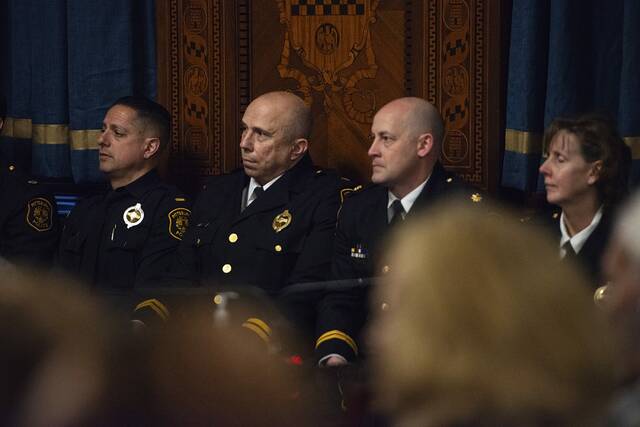Pittsburgh Parks and Recreation Director Kathryn Vargas was aware that a controversial contractor had previously been fired from a different role with the city before she hired him and paid him with a municipal credit card in violation of city policies, according to documents TribLive obtained Friday.
Dozens of emails provided through a Right to Know request show Vargas and other city leaders were notified that Mario Ashkar had been fired from his post in another city department before she hired him on as a contractor to help coordinate and promote farmers markets.
Ashkar, 36, of the North Side, received about $23,000 over the last year while working as a contractor through the city.
City Controller Rachael Heisler brought to light problems with the payments — which were made on a city credit card in violation of a Pittsburgh rule that forbids paying contractors on those cards — last month after Ashkar was charged with an unrelated crime.
Vargas wrote in an email to other city leaders as the news broke that she knew about Ashkar’s prior employment dates with the city “but I did not know much about him outside of that.”
Emails show she was notified when he was fired and offered the opportunity to help select his replacement. He worked in the Office of Special Events while it was housed in the Department of Public Safety. That office shifted into the department Vargas heads shortly after he was fired.
“At the end of the day, I did authorize Mario working for us, and I am the only person to blame if there is a problem with our having worked with him,” Vargas wrote in the message to top city officials.
She acknowledged she was the one who requested to pay Ashkar via p-card — the term officials use to refer to city credit cards — and said she “did not know we were not allowed to do that.”
City policy doesn’t allow contractors to be paid via city credit cards.
It also caps payments to vendors at $10,000 per year — which the city exceeded in payments to Ashkar last year. The city paid him nearly $13,000 last year on a p-card.
Vargas in an April email said she hadn’t realized they had exceeded that limit last year in response to a message from another parks and recreation employee who raised concerns with exceeding that limit. That employee also questioned whether there was “any official documentation/contract with Mario” since there weren’t “any supporting documents other than an invoice (and your [Vargas’s] approval).”
Vargas replied that there was a contract — though that document has not been publicly released — and said she would work to bring Ashkar into the department staff, rather than have him continue working as a contractor, to avoid the $10,000 limit this year.
Instead, his work with the city halted after he was charged in connection with a string of ethnic intimidation incidents.
Vargas, in a different message, said the department planned to part ways with Ashkar at the end of April. It is unclear what caused the change of plans.
After Ashkar was charged with a crime, Vargas said in emails, they stopped working with him April 25.
Ashkar’s final invoice to the city appears to have been altered in early May, according to documents provided in response to a Right to Know request.
Related:
• Pittsburgh controller probes $18K in payments to ex-city worker• Pittsburgh to pay charge linked to contractor scandal amid probe of city credit card use
• Pittsburgh controller, councilman rebuke Gainey over lack of transparency in payment controversy
On May 1, Ashkar submitted an invoice totaling $1,440. Two days later, he emailed Vargas thanking her for “figuring this out” and providing an updated invoice totaling $1,200.
The first invoice had included 12 hours of work each week for four weeks in April, with the latest date listed as April 28. The second invoice removed work conducted April 24 through 28, but added four hours of work for the previous week.
Jake Pawlak, director of the Office of Management and Budget, had previously told City Council members during a public meeting that Ashkar had done no work for the city since being named as a suspect in the ethnic intimidation case April 23.
Ashkar was paid via a PayPal account with the username PrincessJafar, which was sometimes abbreviated in city documents. It was unclear why he was paid in that manner.
P-card payments do process faster than other payment methods for contractors, and Ashkar noted in at least one email that he preferred to be paid through PayPal. After submitting an October invoice, he wrote in an email, “I still have to pay rent so if you can expedite this invoice I would appreciate it.”
There have been questions about whether it was appropriate — or legal — to hire Ashkar as a contractor at all, given that he was fired from another city post less than a year prior. Heisler had indicated the hiring might violate the Pennsylvania Ethics Act, but officials in the administration have dismissed such concerns.
They have, however, acknowledged that paying him via city credit card was a violation of city policies. Maria Montaño, a spokesperson for Mayor Ed Gainey, has acknowledged one or more employees involved in the incident would face standard disciplinary actions. She declined to elaborate.
Emails between Vargas and other city leaders show she was aware that Ashkar had not returned a key and uniform materials after being fired from his prior position in the Office of Special Events, which was housed in the Department of Public Safety at the time of his termination.
Heisler and others in the controller’s office requested documents related to the incident, but did not receive them from the Gainey administration. The controller’s office — which works as an independent fiscal watchdog for the city — nonetheless said it would investigate the incident.
The Gainey administration declined to cooperate with Heisler’s investigation and referred the matter to the Office of Municipal Investigations. That office reports to Chief Administrative and Operating Officer Lisa Frank, a top official in Gainey’s office.
Officials have offered no information on the ongoing OMI investigation and have provided no estimate of when that office might complete its probe.
Pawlak, in an email, told city employees not to share information directly with the controller’s office, but to instead send it straight to him.
Vargas and spokespeople for Gainey did not immediately respond to requests for comment.








